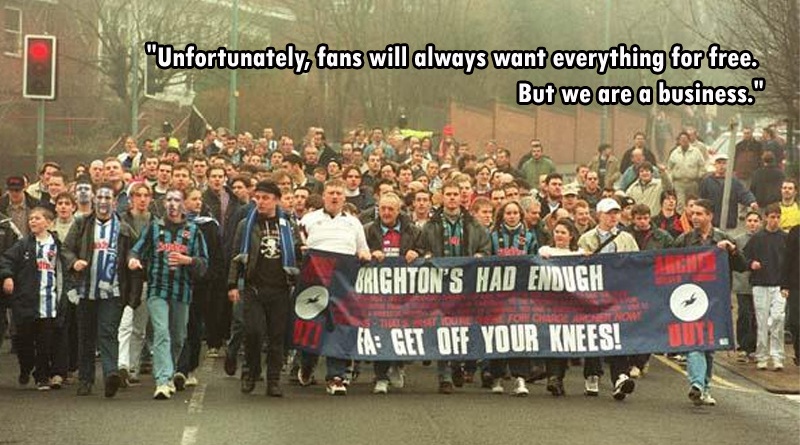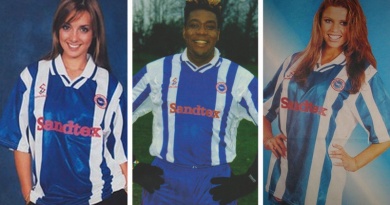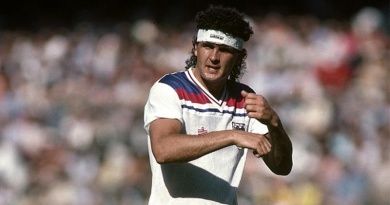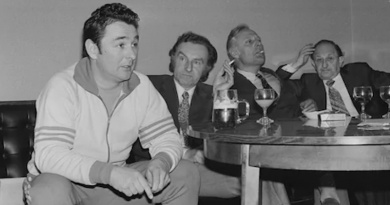5 times Brighton fans paid money to keep the Albion in business
Brighton & Hove Albion CEO Paul Barber had quite a busy weekend as plans by Sky Sports, BT Sport and Premier League clubs to charge supporters £15 per game to watch on television were met by a furious reaction from fans who apparently “always want everything for free”.
Supporters flooded Barber’s inbox with complaints and although he replied to every email, some of what he said showed a gross misunderstanding of why the club that pays him wages of over £1 million per year exists.
In one email subsequently shared on Twitter, Barber wrote to a Brighton supporter called Caroline: “Unfortunately, fans will always want everything for free. But we are a business.”
— Caz (@Seamoo86) October 10, 2020
Say that to Manchester United supporters or Liverpool supporters and maybe Barber would have a point. Brighton & Hove Albion though are a club who would not exist without the financial support of those fans who he thinks want everything for free.
And that’s before we even begin to talk about the contributions of supporters in battling to save the club from Bill Archer, David Bellotti and Greg Stanley, bringing the club back to Withdean Stadium from Gillingham and helping secure planning permission for the Amex Stadium.
So, for Mr Barber – a history lesson. Here are five times those fans who want everything for free dipped into their own pockets to keep the Albion in business. A reminder that without us, Paul, you wouldn’t have a business.
The Alive & Kicking Fund
When the planning permission process for Falmer was undergoing delay after delay after delay in the mid 2000s, Brighton were in serious trouble.
Only 6,000 fans were turning up every week at Withdean and the cost of public inquiries and new applications meant that the club was fast running out of money.
Dick Knight therefore took to launching the Alive & Kicking Fund in the autumn of 2004. The aim was to raise £2 million to tide the club over until the new stadium was given the green light.
A club spokesman said said at the time of the launch: “If all the 30,000 fans who travelled to the Millennium Stadium for last year’s triumphant play-off final victory donated £50, it would raise £1.5 million.”
As well as random donations of cash, the Alive & Kicking Fund was fuelled by other fundraising ideas. Stephen Grant ran comedy shows at the Komedia with all the proceeds going into the fund, John Baine did a 10-and-a-half-hour gig in the Evening Star which raised £2000 and the players stripped off for a semi-naked set of Christmas Cards. Remarkably, Guy Butters wearing nothing but a Santa hat and a set of baubles managed to raise more than £10,000.
Supporters who donated to the fund received nothing in return for giving the Albion their hard earned cash to stay in business. All of which makes a mockery over Barber’s claims that Brighton and football fans always want everything for free.
The 40 Note Fund
The Alive & Kicking Fund was not the only scheme set up to financially help the Albion through the 2000s. The 40 Note Fund was launched by supporters with the aim of raising money so that the club could afford to bring in quality loan players who would otherwise have been out of their financial reach during the Withdean years.
With the Albion trying to compete in the second tier with a strike force of Shaun Wilkinson and Daniel Marney in the opening weeks of the 2002-03 season, Ian Hart used his column in The Argus to present some rough calculations.
Hart wrote that if every one of the Albion’s 4,000 Withdean season ticket holders were willing to “chuck 40 notes” into a fund, it could raise £160,000 to be given straight to Steve Coppell for temporary reinforcements.
The 40 Note Fund was a huge success. In the second half of the 2002-03 campaign, it paid for the loan signings of Ben Roberts and Tony Rougier and the wages of Dave Beasant after the 44-year-old signed on a free transfer.
Chris Iwelumo was another notable signing funded by Brighton fans’ 40 Notes. Without Iwelumo’s contribution on loan, promotion in 2003-04 might never have been won.
The Fund was closed once Tony Bloom began showing his hand as a silent investor in the background. After Bloom sanctioned the £300,000 signing of Glenn Murray from Rochdale in January 2008, there was no need for supporters to pay £40 towards making new signings and so the remaining money in the account was donated to Albion in the Community.
Brighton fans who happily gave up their own money so their club could fund new players could hardly be accused of wanting everything for free.
Buy a Player Fund
We are winding the clock back to December 7th 1970 when Brighton manager Pat Saward launched his Buy a Player Fund. The premise was simple – the Albion boss asked supporters to chip in with whatever they could to help him strengthen a squad that was in real danger of dropping into Division Four.
Brighton fans responded enthusiastically to the plea – especially the school children of Sussex. On February 14th 1971, over 3000 of them took part in a sponsored walk along Madeira Drive to raise money for the Buy a Player Fund. The top two fund raising schools went onto contest the Pat Saward Cup Final on the Goldstone pitch in April.
By the time that day arrived, Saward had put the fund to good use by paying £10,000 to turn Bert Murray’s loan from Birmingham City into a permanent deal.
Brighton were 23rd out of 24 in Division Three at that point in time. With Murray now a full time member of the squad, the Seagulls ended up winning nine and drawing three of their final 17 matches to finish 14th in the table.
The Albion survived relegation thanks to the efforts of Murray, now known as ‘The People’s Player’. Rather than Brighton fans wanting everything for free, supporters of the 1970s had in effect paid for the club to avoid relegation into the bottom division.
Buy a Player Fund II
27 seasons after the first Buy a Player Fund was launched, Knight revived the idea at the start of the 1998-99 season with the aim of supplying Brian Horton with reinforcements.
Brighton were playing home games in Gillingham and finished the previous two seasons 91st in the entire Football League. The Albion didn’t have a pot to piss in and so Knight turned to supporters, asking them to help fund players who might help the club improve on being the second-worst team in England.
Rod Thomas became the second People’s Player in October 1998, signing for £17,000 from Chester City. He was exactly the sort of signing that fans’ hard-earned cash should be going on; a bold, entertaining winger who would have you off your seat whenever he got the ball.
After Thomas arrived, the Albion moved into surprise play off contention with a run of form which included a club-record five away victories in a row.
Unfortunately, it all went a bit wrong when Thomas was injured at the turn of the year and Horton departed to become Port Vale boss. By the time Thomas was fit again, Micky Adams was in charge and the two never really saw eye-to-eye as Thomas’ Brighton career fizzled out.
Save our Seagulls
Back in the early 1990s, Brighton’s biggest fixtures did not come on the pitch but in the high court. There were numerous attempts to wind up the club over unpaid bills to the taxman, PAYE and other clubs among others as seemingly insurmountable debts threatened to put the Seagulls out of business.
Sometimes, the Albion got lucky. Drawing Manchester United in both the League and FA Cups in the 1992-93 season brought in unexpected cash which was put towards settling debts.
Then there was the £350,000 sale of Mark Beeney to The Leeds United which famously kept the club afloat in April 1993. With a winding up threat looming, Barry Lloyd completed the transfer of his number one to Elland Road and then whisked the bankers draft straight to the Worthing Tax Office to keep the club in existence.
When favourable cup draws and player sales weren’t able to save the day, the Albion instead turned to fans to help pay its debts. Des Lynam set up the SOS – Save our Seagulls Fund in an attempt to pay off creditors.
The showpiece fundraising effort was a marathon radio broadcast led by Lynam on Southern FM which raised £28,500 with other events to raise money following.
Rather than Brighton fans wanting everything for free, the club’s supporters had in fact dipped into their own pockets to pay the club’s debts.
Whilst Barber sits in his shiny office at the Amex Stadium in charge of a Premier League club who pay him a very handsome wage, he would do well to remember that fact.




